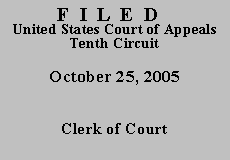

| UNITED STATES OF AMERICA, | No. 04-3507
(D.C. Nos. 04-CV-3215-JWL and 02-CR-20062-JWL) (D. Kan.) |
McMillon is currently serving a sixty-three month sentence following his plea of guilty to preparing false tax returns in violation of 26 U.S.C. § 7206(2), willfully failing to pay over tax to the IRS in violation of 26 U.S.C. § 7202, and wire fraud in violation of 18 U.S.C. §§ 2 and 1343. In addition to his prison term, the district court imposed $621,210.76 in restitution.
In his § 2255 petition before the court below, McMillon argued that the district court erred in calculating the restitution award, that he was not the only perpetrator, and that his counsel provided ineffective assistance in failing to argue for a downward departure. The district court found that McMillon waived the right to collaterally attack his sentence in his plea agreement, and denied his petition. McMillon now seeks a COA from this court.(*)
Before this court, McMillon raises three arguments. First, he argues his counsel provided ineffective assistance by failing to file a direct appeal challenging the district court's sentencing enhancements. However, in his plea agreement, McMillon waived "any right to appeal or collaterally attack any matter in connection with this prosecution and sentence." This waiver includes any ineffective assistance of counsel claim unless it "directly challenges the validity of the plea and, therefore, must be examined in the district court." U.S. v. Cockerham, 237 F.3d 1179, 1191 (10th Cir. 2001). Because McMillon does not attack the validity of the plea agreement, his ineffective assistance of counsel claim falls within the scope of his waiver and must therefore be dismissed.
McMillon next argues that an exception to the waiver within the plea agreement permits his challenge to the sentencing enhancements. His plea agreement provided: "[T]he defendant waives the right to appeal the sentence imposed in this case except to the extent, if any, the court departs upwards from the applicable sentencing guideline range...." McMillon misinterprets this language to create an exception that allows him to appeal not only "upward departures," but also"enhancements." However, sentencing "enhancements" and sentencing "departures" are not synonymous. McMillon's waiver exception for upward departures imposed by the court does not permit challenge to the application of sentencing enhancements. Compare United States v. Hannah, 268 F.3d 937, 940-41 (10th Cir. 2001) (departures from the guidelines are discretionary with sentencing court and as such are reviewed for abuse of discretion), with United States v. Cardena-Garcia, 362 F.3d 663, 665 (10th Cir. 2004) (sentencing enhancements involve application of guidelines and are reviewed de novo). Because the district court did not upwardly depart, but simply applied the sentencing guidelines, his appeal waiver forbids his challenge to the sentencing enhancement.
McMillon also argues that the district court unconstitutionally enhanced his sentence in violation of Booker. This argument, however, if foreclosed by our decision in United States v. Bellamy, 411 F.3d 1182, 1188 (10th Cir. 2005) (holding that Booker should not be applied retroactively to cases on collateral review).
McMillon's application for a COA is therefore DENIED and the appeal is DISMISSED.
ENTERED FOR THE COURT
Carlos F. Lucero
Circuit Judge
*.McMillon's petition was filed after April 24, 1996, the effective date of the Anti-terrorism and Effective Death Penalty Act ("AEDPA"); as a result, AEDPA's provisions apply to this case. See Rogers v. Gibson, 173 F.3d 1278, 1282 n.1 (10th Cir. 1999). AEDPA conditions a petitioner's right to appeal a denial of habeas relief under § 2255 upon a grant of a COA. 28 U.S.C. § 2253(c)(1)(B). A COA may be issued "only if the applicant has made a substantial showing of the denial of a constitutional right." § 2253(c)(2). This requires McMillon to demonstrate "that reasonable jurists could debate whether (or, for that matter, agree that) the petition should have been resolved in a different manner or that the issues presented were adequate to deserve encouragement to proceed further." Slack v. McDaniel, 529 U.S. 473, 484 (2000) (quotations omitted).